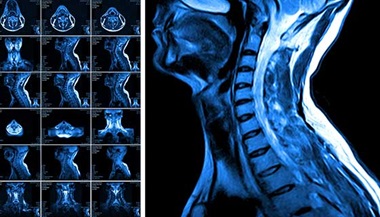Whiplash Injury
What is whiplash?
Whiplash is an injury to your neck. It's caused by your neck bending forcibly forward and then backward, or vice versa. The injury is not well understood. But it often affects the muscles, disks, nerves, and tendons in your neck.
What causes whiplash?
Most whiplash injuries result from a collision that includes sudden acceleration or deceleration. Many whiplash injuries occur when you're involved in a rear-end automobile collision. They also happen as a result of a sports injury, especially during contact sports.
What are the symptoms of whiplash?
These are the most common symptoms of whiplash:
-
Neck pain
-
Neck stiffness
-
Shoulder pain
-
Low back pain
-
Dizziness
-
Pain in your arm or hand
-
Numbness in your arm or hand
-
Irritability
-
Sleeplessness
-
Tiredness
-
Trouble turning your head
These symptoms may be caused by other health problems. Always see your healthcare provider for a diagnosis.
How is whiplash diagnosed?
Along with a complete health history and physical exam, tests for whiplash may include:
-
X-ray. Electromagnetic energy beams make images of internal tissues, bones, and organs onto film. But many whiplash injuries include damage to soft tissue that can't be seen on X-rays.
-
MRI. Large magnets and a computer make detailed images of organs and soft tissue structures in your body.
-
CT scan. X-rays and computer technology make detailed images of any part of your body, including your bones, muscles, fat, and organs. CT scans are more detailed than general X-rays.
How is whiplash treated?
Treatment will depend on your symptoms, age, and general health. It will also depend on how bad the condition is.
Treatment may include:
-
Applying ice for the first 24 hours
-
Neck (cervical) collar
-
Gentle, active movement after 24 hours
-
Nonsteroidal anti-inflammatory drugs (NSAIDs), such as ibuprofen
-
Muscle relaxing medicines
-
Physical therapy
-
Osteopathic manipulation
-
Topical gels or shots into the neck to ease pain
What are possible complications of whiplash?
Most people who have a whiplash injury recover within a few weeks to a few months. Some people have persistent pain for several months or longer.
When should I call my healthcare provider?
Call your healthcare provider if:
-
Your symptoms haven't improved in the time frame your provider advised
-
Your symptoms get worse
-
You have new symptoms
Key points about whiplash
-
Whiplash is not well understood, but it often affects the muscles, disks, nerves, and tendons in your neck.
-
It's caused by the neck bending forcibly forward and then backward, or vice versa.
-
Many whiplash injuries occur if you are involved in a rear-end automobile collision.
-
Your healthcare provider will determine specific treatment for your whiplash.





